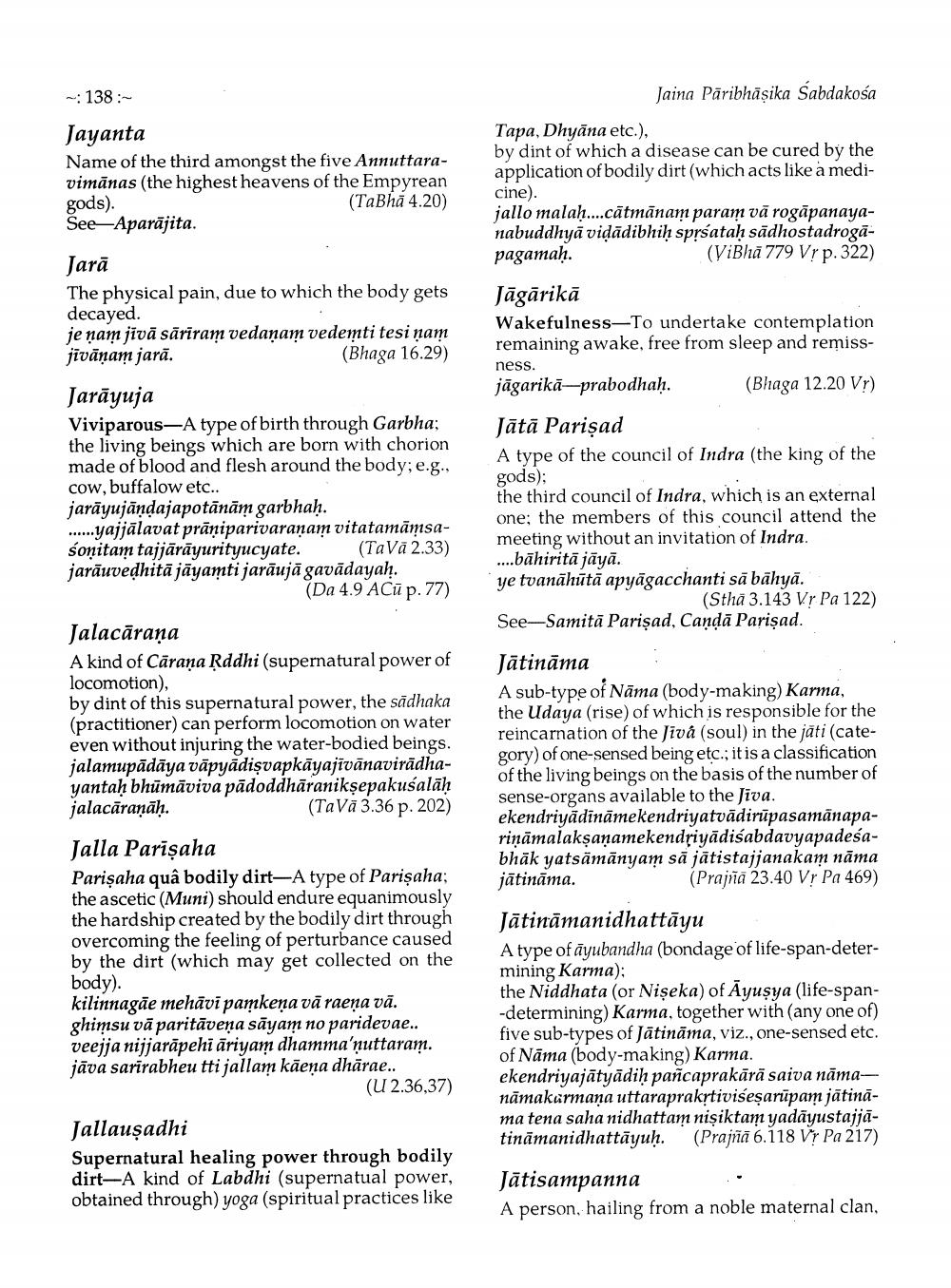________________
- 138:
Jaina Pāribhāșika Sabdakosa
Jayanta Name of the third amongst the five Annuttaravimānas (the highest heavens of the Empyrean gods).
(TaBhā 4.20) See-Aparājita.
Jarā The physical pain, due to which the body gets decayed. je nam jivā sārīram vedanam vedemti tesi nam jīvānam jarā.
(Bhaga 16.29)
Tapa, Dhyāna etc.), by dint of which a disease can be cured by the application of bodily dirt (which acts like a medicine). jallo malah....cātmānam param vā rogāpanayanabuddhyā vidādibhiḥ sprśataḥ sādhostadrogāpagamaḥ
(ViBhä 779 V, p. 322) Jāgārikā Wakefulness-To undertake contemplation remaining awake, free from sleep and remissness. jāgarikā—prabodhaḥ. (Bhaga 12.20 Vr)
Jarāyuja Viviparous—A type of birth through Garbha; the living beings which are born with chorion made of blood and flesh around the body, e.g., cow, buffalow etc.. jarāyujāndajapotānām garbhaḥ. ......yajjālavat prāṇiparivaranam vitatamāmsasonitam tajjārāyurityucyate. (TaVa 2.33) jarāuvedhitā jāyamti jarāujā gavādayah.
(Da 4.9 ACū p. 77)
Jalacārana A kind of Cäraņa Ķddhi (supernatural power of locomotion), by dint of this supernatural power, the sādhaka (practitioner) can perform locomotion on water even without injuring the water-bodied beings. jalamupādāya vāpyādişvapkāyajivānavirädhayantaḥ bhūmāviva pādoddhāraniksepakusalah jalacāraņāḥ.
(Tavā 3.36 p. 202)
Jātā Parişad A type of the council of Indra (the king of the gods); the third council of Indra, which is an external one; the members of this council attend the meeting without an invitation of Indra. ....bāhiritā jāyā. ye tvanāhūtā apyāgacchanti sä bähyā.
(Sthā 3.143 Vr Pa 122) See-Samitā Parişad, Candā Parişad. Jätināma A sub-type of Nāma (body-making) Karma, the Udaya (rise) of which is responsible for the reincarnation of the Jivá (soul) in the jati(category) of one-sensed being etc.; it is a classification of the living beings on the basis of the number of sense-organs available to the Jiva. ekendriyādināmekendriyatvādirūpasamānapariņāmalakṣaṇamekendriyādiśabdavyapadeśabhäk yatsämänyam să jätistajjanakam nāma jātināma.
(Prajña 23.40 V; Pa 469)
Jalla Parīşaha Parişaha quâ bodily dirt-A type of Parişaha; the ascetic (Muni) should endure equanimously the hardship created by the bodily dirt through overcoming the feeling of perturbance caused by the dirt (which may get collected on the body). kilinnagãe mehāvi pamkeņa vā raeņa vā. ghimsu vā paritāveņa sāyam no paridevae.. veejja nijjarāpehi āriyam dhamma'nuttaram. jāva sarirabheu tti jallam kāena dhārae..
(U 2.36,37) Jallausadhi Supernatural healing power through bodily dirt-A kind of Labdhi (supernatual power, obtained through) yoga (spiritual practices like
Jātināmanidhattāyu A type of āyubandha (bondage of life-span-determining Karma); the Niddhata (or Nişeka) of Āyuşya (life-span-determining) Karma, together with any one of) five sub-types of Jātināma, viz., one-sensed etc. of Nāma (body-making) Karma. ekendriyajātyādih pañcaprakārā saiva nāmanāmakarmaņa uttaraprakrtivisesarūpam jātināma tena saha nidhattam nisiktam yadāyustajjātināmanidhattāyuḥ. (Prajñā 6.118 V? Pa 217)
Jātisampanna A person, hailing from a noble maternal clan,




